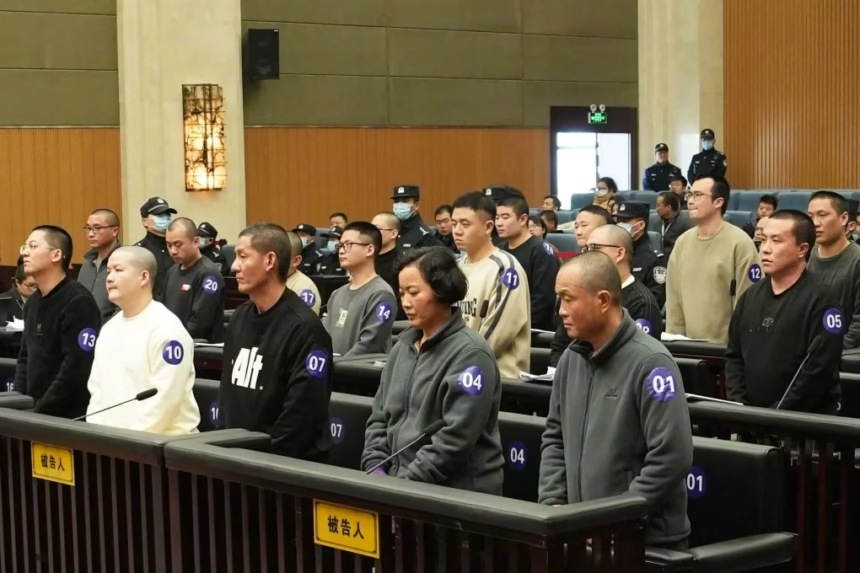BEIJING – The Shenzhen Intermediate People’s Court has sentenced 5 top leaders of a notorious Myanmar cyber fraud network to death. Appeals by defendants, including the alleged mastermind Bai Suocheng, failed. Mafia boss Bai Suocheng and his son Bai Yingcang were among the five men sentenced to death by the Shenzhen Intermediate People’s Court. Yang Liqiang, Hu Xiaojiang, and Chen Guangyi were the other three.
In all, 21 Bai family members and associates were convicted of fraud, homicide, injury, and other crimes, said a state media report published on the court website. The rulings signal Beijing’s hard line against the so-called scam mafia that has turned weak states into crime zones.
This was not routine fraud; it was a sprawling empire. From a base in Myanmar’s unstable Kokang region, the Bai family ran a private militia of more than 200 fighters. Many were ex-soldiers and hired guns armed with Chinese rifles, drones, and even anti-aircraft weapons. Loyalty came through cash and fear, creating a mini-state where law meant nothing. Their proudest project was a web of 41 vast compounds.
They posed as eco-resorts or farm parks, yet they were built like fortresses, with barbed wire, watchtowers, and sealed bunkers. Inside, the work never stopped. Call centres pushed fake crypto deals, romance bots lured targets, and server rooms pumped out phishing hooks. Next door, bright casinos washed the proceeds and drew high-rollers from Bangkok to Beijing.
The human cost hid behind profit sheets. Recruits were trafficked from China’s old industrial towns, Vietnam’s river plains, and African diaspora circles. Many thought they had jobs in hotels or tech. Instead, they woke to chains and quotas. Miss 100 cold calls a day and face the whip.
Worldwide Financial Damage
The damage worldwide has been huge. Operations across the Golden Triangle are thought to drain billions each year. The United Nations Office on Drugs and Crime put losses at 64 billion dollars in 2023. Pig-butchering scams took the largest share. In the United States, the FBI recorded 3.3 billion dollars in 2023, up 20% on previous years.
Europe reported 2.5 billion euros lost, and Australia another 1.2 billion dollars. The method is cold and patient. English-speaking scammers often captivated themselves, built trust on apps like Tinder or Telegram, then steered victims to “sure thing” investments.
Once hooked, accounts are emptied. Some victims lose everything, and some take their own lives. Power brokers in Myanmar, Cambodia, and Laos benefited too, taking around 30% in taxes and kickbacks. Border regions became havens for fraud.
The crackdown came from an unlikely alliance. China, Thailand, and the FBI moved in step. With about 80% of victims being Chinese citizens, and more than 100,000 defrauded in 2023, Beijing shifted from warnings to force.
Officials branded the networks “overseas terrorist organisations”. In mid-2024, elite Chinese teams entered Myanmar and secured handovers amid the civil war chaos. Extraditions followed raids, including 40 in July, and some sites were destroyed in drone strikes.
Thailand’s Fight Against Scam Gangs
Thailand, a long-time transit route, tightened the net. With 50 million dollars in US support, its anti-trafficking units hit 15 sites in Chiang Rai and Ubon. They freed 2,000 people and seized 200 million dollars in assets. “We’ve sealed the sluice gates,” said Thai Police Chief Torsak Sukwimol, crediting joint operations for 500 arrests since January.
The FBI traced Bitcoin flows to the compounds and froze 150 million dollars through FinCEN sanctions. “These aren’t lone wolves, they’re a cartel with keyboards,” FBI Director Christopher Wray told Congress. Five Eyes intelligence cracked encrypted ledgers, revealing money routes to Vancouver property and Dubai yachts.
Behind the numbers sit horrors beyond belief. These Chinese syndicates, many led by figures who fled Xi’s anti-graft drive and tied to triads and Yakuza, rule through raw brutality. In Myanmar’s Myawaddy, Cambodia’s Bavet, and Laos’ Boten, refusal can mean death. Human Rights Watch recorded abuses in 2024.
Torture and Abuse
Electric shocks to genitals for missed targets, stress positions for days, and mock executions with empty guns. Escapees are hunted by bounty teams, then waterboarded or buried alive. A 2023 inquiry in Cambodia found 50 mass graves near Sihanoukville’s failed casino strip.
Victims were starved, shot, or poisoned for “disloyalty”. One survivor, a 28-year-old from Sichuan, told Amnesty International, “They broke us with videos of our families back home, then killed for sport.” Women suffered the worst, trapped in sexual slavery. On compound walls, a slogan made the rules clear: “Work or Die.”
Appeals will run into 2025. The death sentences could be commuted to life, but that looks unlikely under China’s zero-tolerance stance. The cases also expose ASEAN’s part in the problem. Myanmar’s generals pocketed around a billion dollars a year, while Cambodia’s Hun Sen circle protected bosses.
Some shifts are starting. Phnom Penh banned online gambling in 2024, and Laos is weighing extradition deals. For victims like Sarah Kline, a 62-year-old widow in Ohio who lost $400,000 to a fake lover, any justice feels late. “They stole my sunset years,” she said. “Now, let the gallows steal theirs.” The story is not over. The gangs are already moving, fleeing to Africa in search of new bases.














